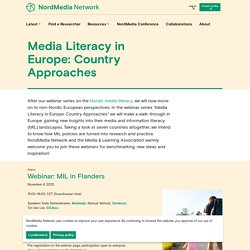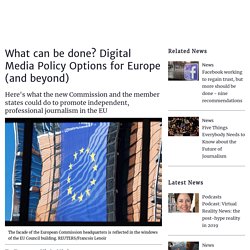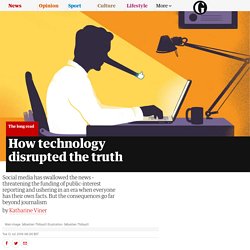

Media Literacy in Europe: Country Approaches (2020-2021) After our webinar series on the Nordic media literacy, we will now move on to non-Nordic European perspectives.

In the webinar series “Media Literacy in Europe: Country Approaches” we will make a walk-through in Europe, gaining new insights into their media and information literacy (MIL) landscapes. Taking a look at seven countries altogether, we intend to know how MIL policies are turned into research and practice. NordMedia Network and the Media & Learning Association warmly welcome you to join these webinars for benchmarking, new ideas and inspiration! Webinar: MIL in Flanders November 4, 2020 15:00-16:00, CET (Scandinavian time)
News Literacy Project. Connecting Classrooms - British Council. MILEN – Global Innovations in Media Literacy. Media and Information Literacy Clearinghouse – UNAOC & UNESCO. First Draft. What can be done? Digital Media Policy Options for Europe (2019) 5.

News Media Policy Context Media policy covers a wide range of different issues and concerns, including public-interest objectives tied to democratic, social, and cultural needs, and is central to creating and maintaining an enabling environment for independent professional journalism, especially when it comes to funding investment in news production. EU member states already have a complex set of media policies in place, encompassing various levels of media regulation, support for private-sector media, and public-service media. The role of the European Union has primarily been around the protection of fundamental rights, the creation of a single market (e.g. in audiovisual services and digital content and services), and a growing number of ancillary policies around media literacy, media pluralism, competition, and media support.
The major challenges for European media policy that directly concern the future of independent professional journalism include: Policy Suggestions. Cairncross Review (2019) Media Literacy Index 2018. Teaching media literacy in Europe (2018) Malicious Use of Social Media: Case Studies From BBC Monitoring (2018) Journalism, fake news & disinformation - UNESCO handbook (2018) MSI-JOQ Committee of experts on quality journalism in the digital age (2018)
You Think You Want Media Literacy… Do You? danah boyd (2018) The below original text was the basis for Data & Society Founder and President danah boyd’s March 2018 SXSW Edu keynote,“What Hath We Wrought?” — Ed. Growing up, I took certain truths to be self evident. Democracy is good. War is bad. And of course, all men are created equal. My mother was a teacher who encouraged me to question everything. I loved pushing people’s buttons with these philosophical questions, but they weren’t nearly as existentially destabilizing as the moments in my life in which my experiences didn’t line up with frames that were sacred cows in my community. The funny thing about education is that we ask our students to challenge their assumptions. The funny thing about education is that we ask our students to challenge their assumptions. For the last year, I’ve been struggling with media literacy.
Most media literacy proponents tell me that media literacy doesn’t exist in schools. Epistemological Warfare Why do we value precision in language? Finding the Red Pill. How technology disrupted the truth (2016) One Monday morning last September, Britain woke to a depraved news story.

The prime minister, David Cameron, had committed an “obscene act with a dead pig’s head”, according to the Daily Mail. “A distinguished Oxford contemporary claims Cameron once took part in an outrageous initiation ceremony at a Piers Gaveston event, involving a dead pig,” the paper reported. Piers Gaveston is the name of a riotous Oxford university dining society; the authors of the story claimed their source was an MP, who said he had seen photographic evidence: “His extraordinary suggestion is that the future PM inserted a private part of his anatomy into the animal.” The story, extracted from a new biography of Cameron, sparked an immediate furore. It was gross, it was a great opportunity to humiliate an elitist prime minister, and many felt it rang true for a former member of the notorious Bullingdon Club. Then, after a full day of online merriment, something shocking happened.
Does the truth matter any more? European Journalism Centre. Engaged Journalism Accelerator. Hack The Press.